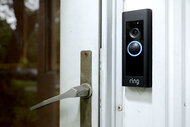Create a free profile to get unlimited access to exclusive videos, breaking news, sweepstakes, and more!
'This Pandemic Has Certainly Been Weaponized:' How COVID-19 Has Impacted The Dynamics Of Domestic Violence
Isolation, stress, and financial strain are factors the National Domestic Violence Hotline says can compromise a survivor’s safety.

Last March, as more people began to work from home and state officials around the U.S. began enacting more widespread precautionary measures due to the worsening coronavirus pandemic, the National Domestic Violence Hotline began tracking how many people cited COVID-19 as a circumstance for their abusive experience.
From March to May of last year, as COVID-19 lockdown and social distancing measures took hold, the hotline saw a 9% increase in contacts. Of the roughly 62,000 calls, texts, or chats fielded over that period, 1 in 10 cited COVID-19 as an underlying factor, according to the Hotline's special report. Notably, however, when looking more closely at each month individually, March actually saw a decrease of 6% as shelter-in-place orders began to take effect, a phenomenon that wasn't all that surprising to those with experience in how such measures affect the dynamics of abusive relationships.
Shelter-in-place “meant that many would be in closer and more frequent proximity to their abusers,” the Hotline’s COVID-19 special report reads.
Crystal Justice, chief external affairs officer with the NDVH, spoke with Oxygen.com over Skype about their findings.
“We knew just based on our previous experience with other natural disasters and even the economic crisis of 2008 that shelter in place meant that many survivors were not going to feel safe reaching out for help,” Justice said. By April, as some restrictions loosened, more abuse survivors felt comfortable reaching out for help and there was a 15% increase in contact volume, according to the Hotline.
While the national hotline saw a 9% increase in contacts in the early months of the pandemic, other local organizations saw more significant increases. The Illinois Domestic Violence Hotline, for example, received more than 28,000 calls in 2020, a 16% increase from the previous year, reports ABC 7 Chicago.
“It’s important to know that there are many local domestic violence organizations that are reporting spikes because they are the ones that are in the moment, on the ground, supporting survivors," Justice said. "Particularly, as that abuse is escalating. So, it makes sense that our contact volume would be inconsistent, and even at times down, during a pandemic and yet local volume for shelters and regional organizations supporting survivors are experiencing spikes.”
Since the NDVH began keeping track, it has received nearly 24,000 contacts specifically mentioning the pandemic. The annual call volume for the national hotline is usually about 400,000 calls total, according to Justice. Pandemic-related inquiries represent about 6% of the total volume from March 2020 to March 2021.
The National Hotline provides 24/7 assistance across the country with advocates available to speak with survivors about their experiences, connect them with local resources, or provide insight on safety planning.
“Number one, any situation that adds stress, financial strain, or isolation can put a survivor at higher risk for abuse,” Justice said. “Both frequency and severity of abuse. This pandemic has elements of all three.”
A second important factor is a partner who chooses to abuse someone often uses anything to further the abuse and exert power or control, including the pandemic, according to Justice.
“Isolation is the strongest tactic an abusive partner can use and right now all of us are isolated,” Justice said.
Other ways the pandemic may exacerbate intimate partner violence are abusive partners sharing misinformation about the pandemic to control survivors or stop them from getting appropriate medical attention; travel restrictions also make it more difficult for survivors to safely leave abusive situations, according to the Hotline’s website.
“A survivor still knows their situation best, right, and ultimately leaving may not be the best option that they choose with good reason,” Justice said. “Our mission at the hotline is to transfer power back to survivors to make their own decisions to pursue safer outcomes.
Among the suggestions the hotline provides to survivors looking for resources are to create a safety plan, practice self-care, and reach out for help.
“Really encouraging survivors to take a moment when they can, especially if they’re sheltering in place with the partner who abuses, because it might be that 10 extra minutes in the shower, or it might be that few moments that they were able to take a walk, that’s the only moment they have for some self-care and some reflection on how they would pursue different options for themselves,” Justice said.
As a reminder to loved ones looking to help a survivor, Justice says there needs to be a cultural shift to believe survivors when they come forward, not judge their choices, and continue to support them.
“I think whether you’re a family member, I think whether you’re an employer, I think whether you’re a policy maker, one of the questions we should be asking is what role should we be playing on making sure we’re doing all we can to support survivors,” Justice added.
If you or a loved one are in need of help and would like to learn more contact the National Domestic Violence Hotline at 1-800-799-7233. You can also text the phrase “LOVEIS” to 22522 to communicate with an advocate by text or contact them via chat on their website.

























